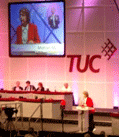On 5 October Martthew Friday's first play, Che Guevara's Motorbike or How I Found My Father, which he is also directing will open at The Rosemary Branch in London. You can read the background on the
Writers' Guild website and follow his trials and tribulations here each week.
Week 1
This is the limbo between being a writer and a director. I start rehearsals on Saturday, and that's the Director's business. Last weekend we did the workshop on the play, which is strictly a Writer's business. This week I'm still tweaking the script and getting phonecalls from the actors asking about individual lines, the motivation for their characters in certain scenes, the meaning behind certain jokes.
Let's go back to last Sunday.
Doing a workshop on any piece of writing is a good idea. As a writer, I am, of course, naturally petrified at the idea of other people reading my work. The fear goes like this: they read, therefore they will hate.
What you have to remember is that blending Descartes with neurosis does not help. You've got to 'put it out there', so to speak. Sure, you're going to get some people give you harsh criticism and inappropriate suggestions. The dance floor of life is filled with many dodgy dancers. (I have a habit of making up proverbs. Spontaneously. Can you tell?) But there's nothing saying you have to work with these people. Try and find readers who respect you enough to be honest but sensitive.
I have my actors and I couldn't ask for a better bunch of creative professionals. Well, I could, but no one will work with me. Only joking. My actors - Kevin Marchant, Paul Brennan, Simone Ashton and Joan Plunkett - joined me last Sunday at Goldsmith College for another argument with the semi-dormant porters who insist that I do not have a room.
"You're name's not on the list. No name, no room."
My name is on the list. You just have to wait for the porters to wake up, turn the page over and look at the right date. Every time.
Our room is one of the identical classrooms in the college and we all spend the day there, pretending we're not back at school. I don't act like any sort of a teacher. My actors are all older and more experienced than me. They've read hundreds of plays and been in just as many. This is just my first.
The workshop consists of reading the play out loud. At the end of every scene we pause and I gather the actors' reactions. From serious plot concerns down to the smallest line, I take note of everything and make almost every change because the actors are almost always right. That's not to say we don't discuss a point made by one person. There's a lot of discussion and I don't always accept a suggestion straight off.
However, I do believe in working collaboratively and developing the script with the people I am working with. Actors have a perspective on characters and plot that writers do not. Having to go on stage and convince an audience that the character is real means they need to understand the logic behind the character. Anything incongruous or ambiguous has to be rewritten. It's hard work. A good actor is very sharp and won't let a single vague line off the proverbial hook.
So, six hours later, it's time to go home and rewrite the play. Not dramatically, this time. Lots of lines were changed and the character of Summer needed considerable development. Her part in the play had become over-complicated in my attempt to make her back-story more convincing.
I've had several more conversations with Joan (who is playing Summer) this week. I won't be happy about the character until she is. Simone is going to read the play again tonight and do a final edit for me. The play was 76 pages long when we performed it at the Colour House, and now it's 83. The plot is slightly more complicated and farcical, but that was necessary. There are also more jokes. I now want to tighten it. If I can retain my plot changes and jokes, and get it back down to 76 pages in time for the first rehearsal on Sunday, I'll be as chuffed as a chough.
Fingers crossed for Sunday.
By the way, as a means of combing research and relaxation I went to see The Motorcycle Diaries. Because I am running out of both words (in my limited count) and time before I have to go to bed, I'll keep my reaction short. It's a cinematic masterpiece. And no, I did not know the film was being made when I wrote my play. It's a case of what I call 'cultural' timing, when a subject or person rises back up the surface of collective consciousness at the same time.
There is, as I write, a play about Che Guevara being developed as well as a musical (can you imagine that?) and a big budget Hollywood biopic. My play is not actually about Che Guevara. It's about a left-wing English journalist who idealises the famous revolutionary while searching for his father.
Please go and see my play before you get tired of hearing about Che Guevara.





